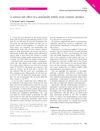Search
for
Sort by
Research
30-60 / 485 resultsresearch Arthritic Lifestyles

research 2014 Female Athlete Triad Coalition Consensus Statement on Treatment and Return to Play of the Female Athlete Triad: 1st International Conference Held in San Francisco, California, May 2012 and 2nd International Conference Held in Indianapolis, Indiana, May 2013
The consensus provided guidelines for treating the Female Athlete Triad and a system to decide when athletes can return to sports.
research Metabolism of Androgens by Isolated Human Beard Hair Follicles
Human beard hair follicles change testosterone into other related hormones, but don't much change androstenedione into testosterone.

research Contemplation On Polycystic Ovarian Syndrome
PCOS is a common hormonal disorder in women, causing symptoms like acne and irregular periods, and is managed with medication and lifestyle changes.

research Healthy Lifestyle and Dietary Approaches to Treating Polycystic Ovary Syndrome: A Review
Eating healthy, exercising, and changing behaviors are the best first steps to treat Polycystic Ovary Syndrome (PCOS).

research Alopecia Areata: Understanding and Treatment
Alopecia areata's causes are unclear, treatments exist but relapses are common.
research Nutritional Factors Influencing Hair and Wool Growth

research Genital Dermatology and Hidradenitis Suppurativa
A new diagnostic tool for Vulvovaginal Lichen Planus is highly accurate, and updated treatments for various skin conditions, including melanoma and Hidradenitis Suppurativa, were discussed.

research Lean Women with Polycystic Ovary Syndrome
PCOS in lean women is a serious health condition with implications beyond fertility, affecting metabolism and increasing cardiovascular disease risk.

research A Management Model to Promote Hair Growth for Androgenetic Alopecia Cases Through Yoga and Ayurveda
Yoga and Ayurveda, including stress management and herbal oil use, can potentially reduce hair loss and promote hair growth, with further research needed for therapy protocols.
research Effect of Lifestyle and Weight Control on Skin and Scalp Health in People in Their 20s and 30s
Healthy lifestyle and weight control improve skin and scalp health in young adults.

research Ingestion of Topical Steroid Triggering Pustular Psoriasis?
Accidentally eating a topical steroid may rarely cause acute generalized pustular psoriasis.

research A Serious Side Effect of a Potentially Widely Used Cosmetic Product
A man developed a serious muscle breakdown condition after using a hair loss medication not known to cause this side effect.

research Serum Levels of VWF, t-PA, TNF-α, and ICAM-1 in Patients Receiving Hemocoagulase Combined with Platelet-Rich Plasma During Total Hip Replacement
Using hemocoagulase with platelet-rich plasma in hip replacement can lessen blood loss and improve healing and blood clotting.

research A Case Study on Successful Ayurvedic Management of Polycystic Ovarian Syndrome Induced Infertility
Ayurvedic treatment helped a woman with PCOS become pregnant and have a healthy baby.
research An Overview of Amenorrhea
Amenorrhea, or missing periods, is caused by various factors and is treated based on the specific cause.
research Exosomes/EVs: Advanced Cell-Based Therapies for Hair Loss: A Comprehensive Systematic Review

research Women's Health Considerations for Lipid Management
The conclusion is that managing cholesterol is important for women, especially during pregnancy, breastfeeding, and with PCOS, and involves regular screening and careful treatment choices.

research Polycystic Ovary Syndrome in Adolescents
Early diagnosis and treatment are key to managing health risks in teens with PCOS.
research Prenatal Diagnosis of a Fetus with Partial Monosomy 4p and Partial Trisomy 13q
Topical corticosteroids are the best initial treatment for children with Alopecia Areata.
research S124 Variants of Myxoid Cysts: Diagnosis and Treatment
Common hair loss can be diagnosed with a physical exam and sometimes a hair test or skin biopsy, and treated with medication or surgery, with ongoing treatment needed to keep results.
research Evaluation of a Trichometer to Quantify the Prevention of Hair Loss by Scalp Cooling During Chemotherapy
research Peripheral Arterial Disease: Diagnosis and Management
Early recognition and treatment of Peripheral Arterial Disease is crucial to improve survival and health outcomes.

research Managing Polycystic Ovary Syndrome: A Cognitive Behavioral Strategy
Cognitive behavioral strategies help women with PCOS make lifestyle changes to improve their health.

research Is Androgenetic Alopecia a Risk for Atherosclerosis?
Severe vertex pattern hair loss may indicate a higher risk for artery plaque buildup.

research Polycystic Ovary Syndrome
PCOS is a common condition in women that causes various symptoms and health issues, treatable with lifestyle changes and medication.

research Significant Effects of Mild Endogenous Hormonal Changes in Humans: Considerations for Low-Dose Testing
Small hormonal imbalances can cause significant health problems, so more sensitive testing for hormone-disrupting chemicals is needed.

research Management of Polycystic Ovary Syndrome in Women by Implementing a Healthy Lifestyle and Effective Diet: A Review
Eating healthy, exercising, and certain nutrients like myoinositol and omega-3s can help manage PCOS symptoms.